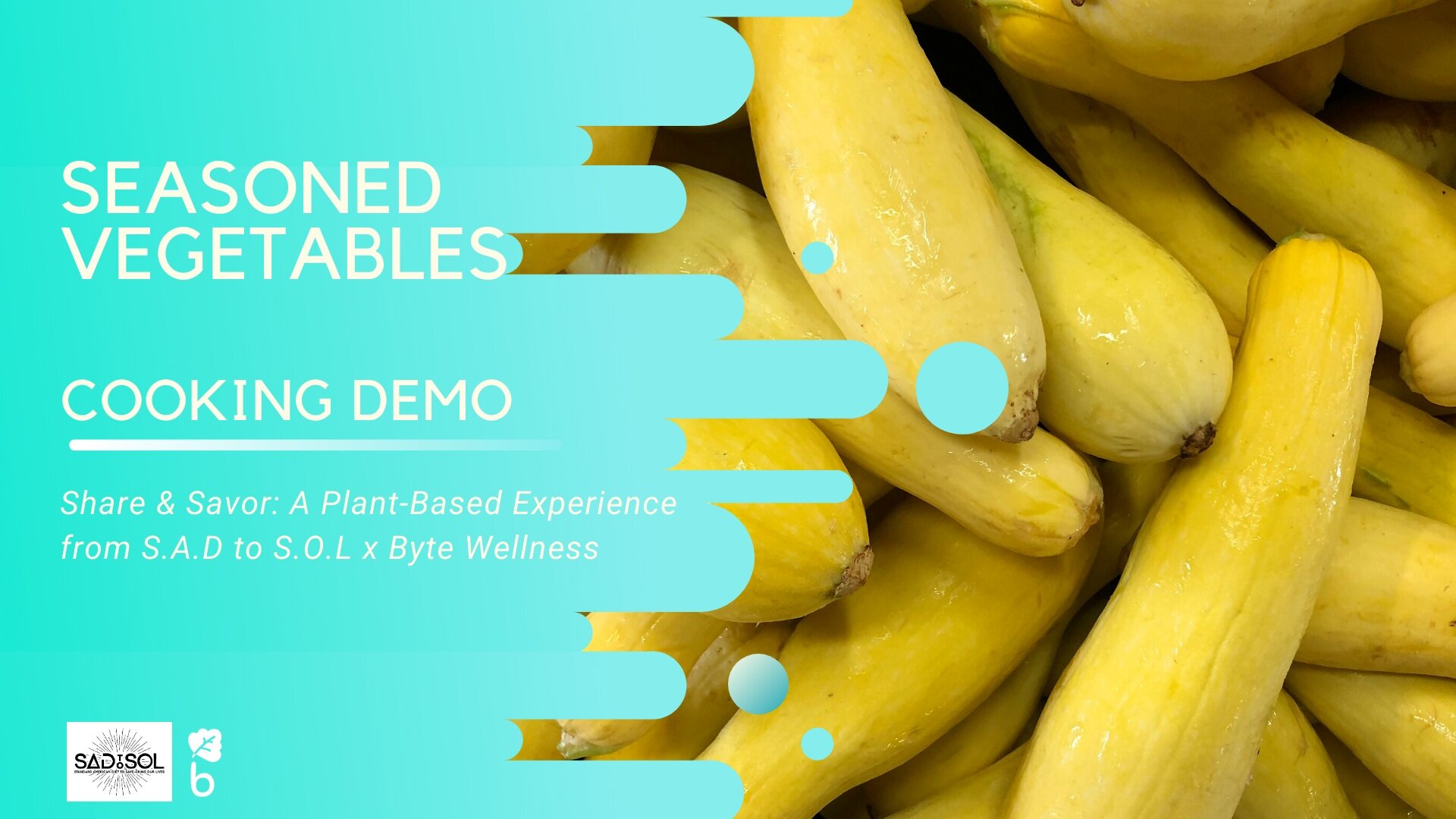Important References on the Plant-Based Lifestyle, Nutrition and Health
KNOWLEDGE IS POWER!
WE TAKE FACTS AS SERIOUSLY AS WE TAKE WELLNESS.
But, even we don’t make a habit of compiling works cited for no reason!
Below are the references from our Share & Savor Experience. And we’re giving them to you for FREEEE!
Scroll down for the references
What’s Share & Savor?
Plant-Based Chef/Educator, Araba Esoun, collaborated with Byte Wellness to provide you with a transformational introduction to plant-based eating. It’s called Share & Savor: a Plant-Based Experience. Click to check it out.
The 56-page Share & Savor Guidebook also included 4 pages of references that we cited throughout the experience (including the videos). We’re making those references available to you here.
Become a Healing Member to get weekly workshops and daily wellness lessons showing you the science-based ways your habits can prevent chronic diseases like type 2 diabetes and heart attack.
References
Type 2 Diabetes
Eating a plant-based diet can reduces the risk of developing diabetes and helps manage it when people already have type 2 diabetes
https://jamanetwork.com/journals/jamainternalmedicine/fullarticle/2738784
For people with type 2 diabetes: Changing some health behaviors can lower risk of peripheral blood vessel disease (which can eventually leads to limb amputation)
These avoidable factors can increase the risk of developing type 2 diabetes: overweight/obesity, high cholesterol, high blood pressure, smoking:
https://www.heart.org/en/health-topics/diabetes/understand-your-risk-for-diabetes
Beta cell fatigue and insulin resistance work together to increase the risk of type 2 diabetes and accelerate progression in people who already have type 2 diabetes:
https://www.ncbi.nlm.nih.gov/pmc/articles/PMC3608918/#__sec1title
Heart Health
The PREDIMED study showed eating a mediterranean diet (rich in fresh produce and heart-healthy monounsaturated fats and omega 3 fats) has a bigger effect on lowering risk of heart attack compared to a low-fat diet
https://www.nejm.org/doi/full/10.1056/NEJMoa1800389?query=featured_home
Eating omega 3 polyunsaturated fats is linked to lower risk of heart disease, and lower risk of death from heart disease
https://www.ahajournals.org/doi/full/10.1161/circulationaha.114.015176
Plant-heavy diets are linked to lower risk of high blood pressure
Overweight and Obesity
Plant-based diets can help people successfully lose weight and maintain it.
Eczema
The link between eczema (Atopic Dermatitis) and food:
https://nationaleczema.org/atopic-dermatitis-and-allergies-connection/
Mental Health
Plant-based diets haven’t been proven to affect mental health or cognition
https://www.nature.com/articles/s41398-019-0552-0
Cancer
Compared to eating a "Western" Diet (high in red meats, low in plants), eating a plant-heavy diet is linked to lower risk of colon cancer
https://www.ncbi.nlm.nih.gov/pmc/articles/PMC5447483/pdf/nihms855864.pdf
https://pubmed.ncbi.nlm.nih.gov/15704172/
The CDC identified 13 cancers that are related to being overweight or obese. These include breast, ovarian, uterine and colon cancer
https://www.cdc.gov/media/releases/2017/p1003-vs-cancer-obesity.html
Nutrition
Definition of Standard American Diet
The United Nations' NOVA food classification system helps us understand which foods are more and less processed:
http://www.fao.org/3/ca5644en/ca5644en.pdf
Bok choy is in the antioxidant-heavy cruciferous family
https://lpi.oregonstate.edu/mic/food-beverages/cruciferous-vegetables
Nutrient content source for foods (i.e protein in quinoa) was retrieved from the USDA database called Food Data Central:
The color of fruit and vegetables is a clue to their phytonutrient and phytochemical profiles
https://www.health.harvard.edu/staying-healthy/add-color-to-your-diet-for-good-nutrition
MyPlate eating pattern for well-balanced meals
https://www.choosemyplate.gov/
Apple cider vinegar that is unrefined and unfiltered has a cloudy collection of probiotic bacteria and yeast in it. Many people call this the “mother”
Fats
3 Types of Fats
https://www.heart.org/en/healthy-living/healthy-eating/eat-smart/fats/dietary-fats
Of the 3 types of Omega 3 fatty acids plants only make 1 type (ALA), which your body converts in small amounts to the other two types (DHA and EPA)
https://lpi.oregonstate.edu/mic/other-nutrients/essential-fatty-acids
https://pubmed.ncbi.nlm.nih.gov/1825498/
Trans-saturated fats are considered harmful (“not generally recognized as safe”) by the FDA
Sugar
The daily limit for free sugars and added sugars varies across organizations. The CDC and AHA count added sugars only. The WHO recommends limiting both free sugars and added sugars:
https://www.cdc.gov/nutrition/data-statistics/know-your-limit-for-added-sugars.html
https://www.heart.org/en/healthy-living/healthy-eating/eat-smart/sugar/added-sugars
https://www.who.int/mediacentre/news/releases/2015/sugar-guideline/en/
www.bytewellness.com/blog/plant-based-low-sugar-starter-byte
Eating food with flavonoids can help lower blood sugar
Whole Grains & Quinoa
The popularity of quinoa seems to be contributing to the wealth of indigenous farmers in the Andes.
http://webapps.towson.edu/cbe/economics/workingpapers/2016-06.pdf
Some researchers warn that the large volume of quinoa crop may have negative effects on the soil health and land availability in the long-run.
https://www.mdpi.com/2071-1050/10/2/532
The refining process that turns whole wheat (brown) into refined wheat (white) strips away nearly all of its fiber, 90% of the vitamin E, and half of its B vitamins
https://www.hsph.harvard.edu/nutritionsource/what-should-you-eat/whole-grains/
http://webapps.towson.edu/cbe/economics/workingpapers/2016-06.pdf
The American Diabetes Association considers quinoa a superfood for people with diabetes
https://www.diabetes.org/nutrition/healthy-food-choices-made-easy/diabetes-superfoods
Quinoa is a complete protein
https://www.health.harvard.edu/newsletter_article/isnt-quinoa-a-supplier-of-complete-proteins
Science of Health Behaviors
In one study, people named the lack of availability and affordability of food and fear of family disapproval as the major barriers to eating a plant-based diet .
Health Disparities
Compared to White Americans, Black Americans are more likely to live in a food desert, even when income and education level are equal
https://www.ncbi.nlm.nih.gov/pubmed/17010248
Various definitions of food desert:
http://www.ers.usda.gov/data-products/food-access-research-atlas.aspx
www.bytewellness.com/blog/what-is-a-food-desert
Living in a food desert is linked to lower fruit/veggie intake and poorer health outcomes
https://www.ncbi.nlm.nih.gov/pubmed/16530621
Food Swamps are the New Food Deserts
https://www.ncbi.nlm.nih.gov/pubmed/16530621
www.bytewellness.com/blog/what-is-a-food-swamp
Compared to White women, Black women are more than 3 times as likely to die during or shortly after childbirth
https://www.cdc.gov/reproductivehealth/maternalinfanthealth/pregnancy-mortality-surveillance-system.htm
Black women are TWICE as likely as White women to die from heart disease before age 75
https://www.cdc.gov/minorityhealth/chdir/2011/factsheets/CHDStroke.pdf
Despite being less likely to develop breast cancer, Black women’s death rates from breast cancer are 40% higher than those of white women.
Studies show that (in addition to Black women’s tendency to have more biologically active breast cancers) societal factors like “poverty and racism” are partially responsible for the fact that Black women are more likely to die from Breast Cancer than White women.
https://cebp.aacrjournals.org/content/cebp/17/11/2913.full.pdf
Here are some ways the social factors manifest, according to the authors: “lack of recommendation for screening mammography, poor access to health care, and cultural beliefs discouraging women from seeking care for a potential breast problem”.
https://cebp.aacrjournals.org/content/cebp/17/11/2913.full.pdf
Compared to White Non-Hispanic Americans, Black Americans and Indigenous Americans are 5 times more likely to be hospitalized with COVID-19; Latinos are 4 times as likely.
https://www.cdc.gov/coronavirus/2019-ncov/need-extra-precautions/racial-ethnic-minorities.html
One study of patients in Northern California found that compared to non-Hispanic White Americans, non-Hispanic Black Americans had 2.7 times the odds of being hospitalized for COVID-19, even after adjusting for co-morbid conditions.
https://www.healthaffairs.org/doi/10.1377/hlthaff.2020.00598#.XurMLU7UlsY
More from Share & Savor: Watch Araba’s 4 Plant-Based Cooking Classes
More from Share & Savor: Watch the 7-Part Plant-Based Mindset Conversation Between Chef/Educator Araba and Dr. Wuse from Share & Savor
Prefer to get your lessons sent directly to your phone? Sample the Starter Byte Course. It’s an Intro to plant-based eating.



















